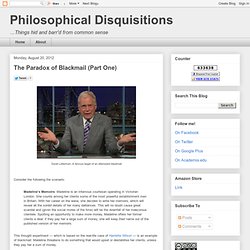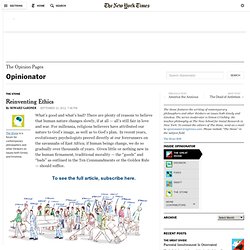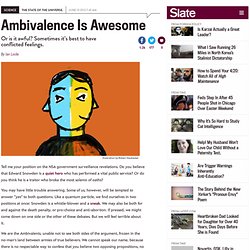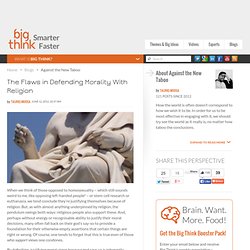

The Ethics of Autonomous Cars. If a small tree branch pokes out onto a highway and there’s no incoming traffic, we’d simply drift a little into the opposite lane and drive around it.

But an automated car might come to a full stop, as it dutifully observes traffic laws that prohibit crossing a double-yellow line. This unexpected move would avoid bumping the object in front, but then cause a crash with the human drivers behind it. Should we trust robotic cars to share our road, just because they are programmed to obey the law and avoid crashes? Our laws are ill-equipped to deal with the rise of these vehicles (sometimes called “automated”, “self-driving”, “driverless”, and “robot” cars—I will use these interchangeably). For example, is it enough for a robot car to pass a human driving test?
Sam Richards: A radical experiment in empathy. The Mathematics of Murder: Should a Robot Sacrifice Your Life to Save Two. There are no significant facts about human beings. By Charles Foster A few days ago, at dinner, I sat next to a well-known literary biographer. As you’d expect, we fell to talking about the biographer’s obligations, and as you’d also expect, she said that the biographer should be neither advocate nor prosecutor – indeed should strive to keep herself out of the book as much as possible, aiming for objectivity. I heard myself saying that, worthy though this aspiration may be, it was so obviously doomed to failure that it probably wasn’t worth trying. Philosophical Disquisitions: The Paradox of Blackmail (Part One) Consider the following the scenario: Madeline’s Memoirs: Madeline is an infamous courtesan operating in Victorian London.

She counts among her clients some of the most powerful establishment men in Britain. With her career on the wane, she decides to write her memoirs, which will reveal all the sordid details of her many dalliances. This will no doubt cause great scandal and (given the social mores of the time) will be the downfall of her indecorous clientele. Spotting an opportunity to make more money, Madeline offers her former clients a deal: if they pay her a large sum of money, she will keep their name out of the published version of her memoirs. Stephen Coleman: The moral dangers of non-lethal weapons. Reinventing Ethics. The Stone is a forum for contemporary philosophers and other thinkers on issues both timely and timeless.

What’s good and what’s bad? There are plenty of reasons to believe that human nature changes slowly, if at all — all’s still fair in love and war. For millennia, religious believers have attributed our nature to God’s image, as well as to God’s plan. In recent years, evolutionary psychologists peered directly at our forerunners on the savannahs of East Africa; if human beings change, we do so gradually over thousands of years. Given little or nothing new in the human firmament, traditional morality — the “goods” and “bads” as outlined in the Ten Commandments or the Golden Rule — should suffice.
My view of the matter is quite different. The Ying and the Yang of World Hunger. Raymond Tallis - The case for assisted dying. Stanley Kubrick never fails to impress me. Ambivalence: Conflicted feelings cause discomfort and creativity. Illustration by Robert Neubecker Tell me your position on the NSA government surveillance revelations.

Do you believe that Edward Snowden is a quiet hero who has performed a vital public service? Do Business Schools Incubate Criminals? The recent scandals at Barclays Plc, JPMorgan Chase & Co., Goldman Sachs Group Inc. and other banks might give the impression that the financial sector has some serious morality problems. Unfortunately, it’s worse than that: We are dealing with a drop in ethical standards throughout the business world, and our graduate schools are partly to blame. Consider, for example, the revelations about two top executives at the elite consulting firm McKinsey & Co., which has avoided public vilification despite the transgressions of its former employees.
McKinsey director Anil Kumar, -- a graduate of the University of Pennsylvania’s Wharton School -- pleaded guilty to providing insider information to hedge-fund manager and fellow Wharton alumnus Raj Rajaratnam. Why prison doesn't work and what to do about it. The Flaws in Defending Morality With Religion. When we think of those opposed to homosexuality – which still sounds weird to me, like opposing left-handed people* – or stem-cell research or euthanasia, we tend conclude they’re justifying themselves because of religion.

But, as with almost anything underpinned by religion, the pendulum swings both ways: religious people also support these. And, perhaps without energy or recognisable ability to justify their moral decisions, many often fall back on their god’s say-so to provide a foundation for their otherwise empty assertions that certain things are right or wrong. Mark Rowlands - Animal morality. Debunking an urban legend: "Evil is a lack of something"
Thanks to Martin at for reformulating an argument of mine that I've given in the past.

I'll use his reformulation: Now for the story: The university professor challenged his students with this question: Did God create everything that exists? " A student bravely replied, "Yes, he did! " "God created everything? " The professor answered, "If God created everything, then God created evil; since evil exists and, according to the principal that our works define who we are then God is evil. " Another student raised his hand and said, "Can I ask you a question professor? " The student continued, "Professor, does darkness exist?
" Finally the young man asked the professor, "Sir, does evil exist? " To this the student replied, "Evil does not exist, Sir, or at least it does not exist unto itself. The professor sat down. The young man's name --- Albert Einstein. Robot Bartender Struggles With Asimov's Laws In This Amazing Short Film.